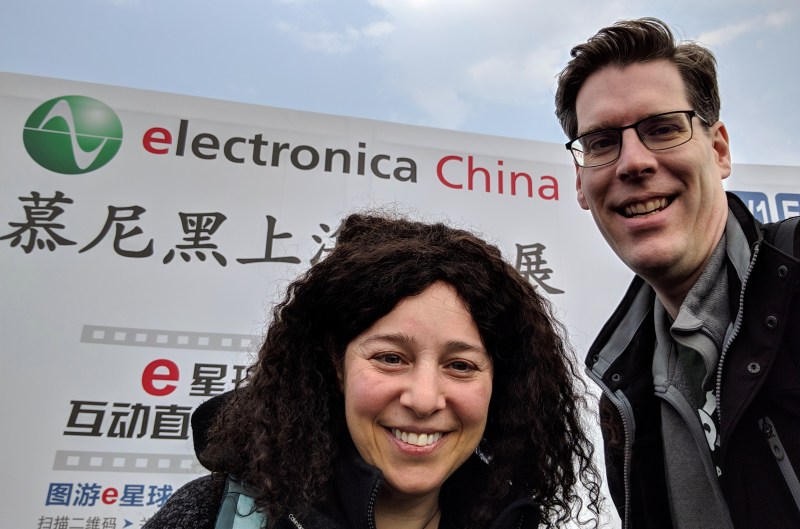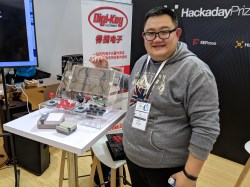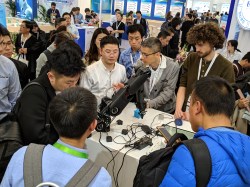My first full day in China was spent at Electronica, an absolutely massive conference showcasing companies involved in electronics manufacturing and distribution. It’s difficult to comprehend how large this event is, filling multiple halls at the New International Expo Center in Shanghai.
I’ve seen the equipment used for PCB assembly many times before. But at this show you get to see another level below that, machines that build components and other items needed to build products quickly and with great automation. There was also big news today as the 2019 Hackaday Prize China was launched. Join me after the break for a look at this equipment, and more about this new development for the Hackaday Prize.
First Ever Hackaday Prize China!

For the past five years, the Hackaday Prize has been open to engineers from around the globe. But this year we’re stepping up the effort to help involve a lot more people from China who enjoy developing new products. On Wednesday, a large audience gathered at the Bom2buy booth (one of Supplyframe’s China-based companies) to celebrate the beginning of the 2019 Hackaday Prize China. This design contest is specifically for hackers, designers, and engineers who are more comfortable documenting their development process in Chinese. Up to ten finalists from the Hackaday Prize China will be invited to the final round of the soon-to-launch Global Hackaday Prize with the assistance of translation services in order to share their product development process with in English. We know there’s all kinds of amazing work going on here in China and this will make it easier to share those stories with the non-Chinese-speaking Hackaday community.
It was great to meet some local hardware hackers at the launch ceremony. This is Yoyojacly who gave a talk about the Raspberry Pi based arcade console he built. This is obviously an eye-catching build, and I got to speak with him for a half hour or so afterward and his projects run deep! He and his office colleagues have automated everything from the fish feeder to the lights. They recently picked up a used LIDAR sensor and are working on building an autonomous robot to take out the garbage after seeing much success with their Donkey Car (a tensor-flow based autonomous rover) project. Yoyjacly is a member of the Mushroomcloud hackerspace here in Shanghai.
It’s really cool that two people from the Dexter robotic arm team were able to make it to Shaghai for the conference. Dexter won the 2018 Hackaday Prize and were invited to exhibit in the Bom2buy booth. Dexter has silky-smooth movements and great positional awareness thanks to its high-accuracy optical encoder scheme. It had no problem attracting a crowd throughout the day.
Cool Machines That Build Parts and Assemblies for the Electronics Industry
Six years ago I attended Electronica in Munich, but I don’t remember seeing the sheer number of eye-popping automation displays I found on Wednesday at Electronica Asia. Perhaps this is because technology has advanced quickly over those years, but I suspect it’s more that the close proximity to such large manufacturing hubs means it is easier to transport these machines for demonstrations.
To really grasp what these machines can do you really need to see them in action, and I plan to put together video of many examples once there is more time to do the editing work. There were demos of machines that separate silicon dies and put them into trays and die-bonding machines that place the slivers of complex silicon and connect them to the metal leads.
I saw the injection machines that create the familiar black plastic packages for those chips. There were IC sorting machines used to automatically test completed parts and to flash code to microcontrollers when you order them preprogrammed.
There was an entire hall devoted to cable making where mesmerizing robotic precision measured wire to exact length, cut and stripped each end, crimped connectors onto each, and inserted them into plastic housings. All of this is a dizzying stack of manufacturing that has been optimized for efficiency at every conceivable step from raw material, to component, to assemblies that go on to produced finished products. And it pulls back a curtain that was previously hiding remarkable industrial automation.
Up Next: Visiting a Favorite Chip Design Company, and Heading to Southern China
 After a very long day at a very large conference, we unwind with amazing hot pot! “Noodles” on ice in bottom right are actually tofu. Red-tipped bottle is delicious plum liquor I lovingly refer to as “jet fuel” (use with caution). Alas, this my only full day in Shanghai.
After a very long day at a very large conference, we unwind with amazing hot pot! “Noodles” on ice in bottom right are actually tofu. Red-tipped bottle is delicious plum liquor I lovingly refer to as “jet fuel” (use with caution). Alas, this my only full day in Shanghai.
On Thursday morning I’m meeting up with Ivan Grothotkov at Espressif, makers of the ESP8266 and ESP32. We plan to record a segment for the Hackaday Podcast to cover how he joined up with the company and what they’re up to these days. Later in the afternoon Sophi Kravitz and I will depart for Shenzhen where we’ll meetup up with our friend Scotty Allen and head to Seeed Studios’ X.Factory for a Hackaday meetup. I’ll let you know about those adventures in the next installment so keep your eye on Hackaday!
























One day I will establish my office in China.
As long as you don’t own it, and can split your business with a Chinese citizen who owns 51% – which means they will own 100% in three years and no one will answer your questions on how it happened :-)
Salty
Apply for chinese citizenship? Cant be that expensive?
It would take a fortune in bribes to party officials and still not happen unless you have close relatives who are Chinese nationals, and a very good reason.
Now, as a foreigner, you can start a wholly owned company.
Very interesting. If I was young I would seriously consider Guangzhou. And I have a nephew teaching in Chengdu.
enjoy the ‘air quality’ (cough cough).
damn, I don’t even want to go there for business, and my company has a main office in SH
plus, the china govt scares the crap out of me. no way I want to get stranded there. not that I’m high-value, but still, I would not want to even give them the chance to block my exit. stuck in china would be HELL.
so, while I’m curious, I have no desire to actually go there.
Funnily enough, those are the exact feelings I have about the Silicon Valley recently, down to air quality.
I feel the same, but mostly just beijing freaks me out.
I am more comfortable visiting shanghai.
I always feel like there is a chance they might stop me from leaving at the airport.
The fact that I gain like 20 pounds and my passport picture doesn’t look like me any more adds to my anxiety.
No one wants to trap you in China. They’re a thousand times more likely to fine you and put you out than to detain you. Unless you’re smuggling something. I’m in and out and all over China every year, no problems. I once carried an 8″ chefs knife through multiple layers of security and no one, including me, noticed. No one cares. And it’s safe. I can walk anywhere at any time and I’m not worried about bad shit happening to me. Someone might try to scam me, but that’s on me if I fall for it.
Very cool trip guys !
” And it pulls back a curtain that was previously hiding remarkable industrial automation.”
In a country that doesn’t need unemployment.
Does any country need unemployment?
It should be a wake up call for all of us that china is putting so much emphasis on automation.
Most manufacturer jobs are not only not coming back to the US.
Those job will be taken over by machines.
Of course, we still don’t have 100% automation in most factories.
Humans are still the most flexible work force in changing conditions.
That said, a large portion of manual labor will most likely be done by machines which means fewer human employees.
State subsidies can do all that…A Hackaday article on Xianjing ‘tech’ would be interesting.